Nintendo released a new Pokémon spin-off on the 3DS eShop today called Pokémon Shuffle. You can download it right now if you want to, because it’s free. But just because it’s free doesn’t make the game worth your time.
I’ve been playing the game on and off today, and here’s what I experienced.
When you start the game, you meet a woman who appears to be a reporter. She walks you through the tutorial, where she explains the basics of the game:
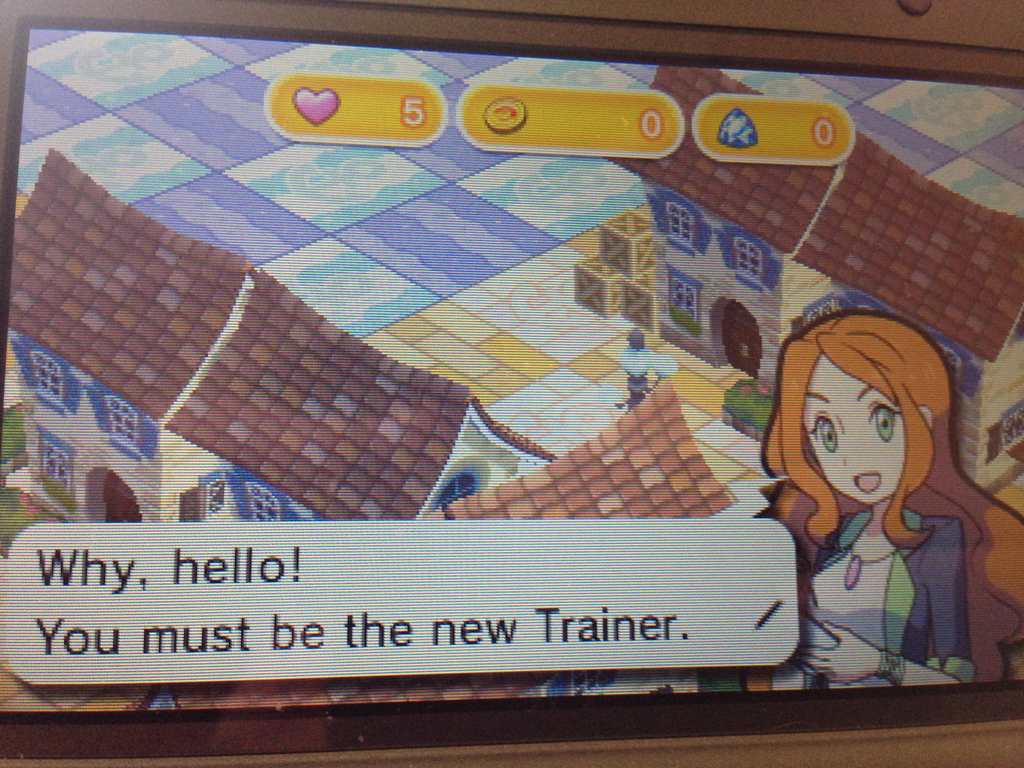
The first thing she explains to you is the hearts system. Hearts are necessary to play the game:
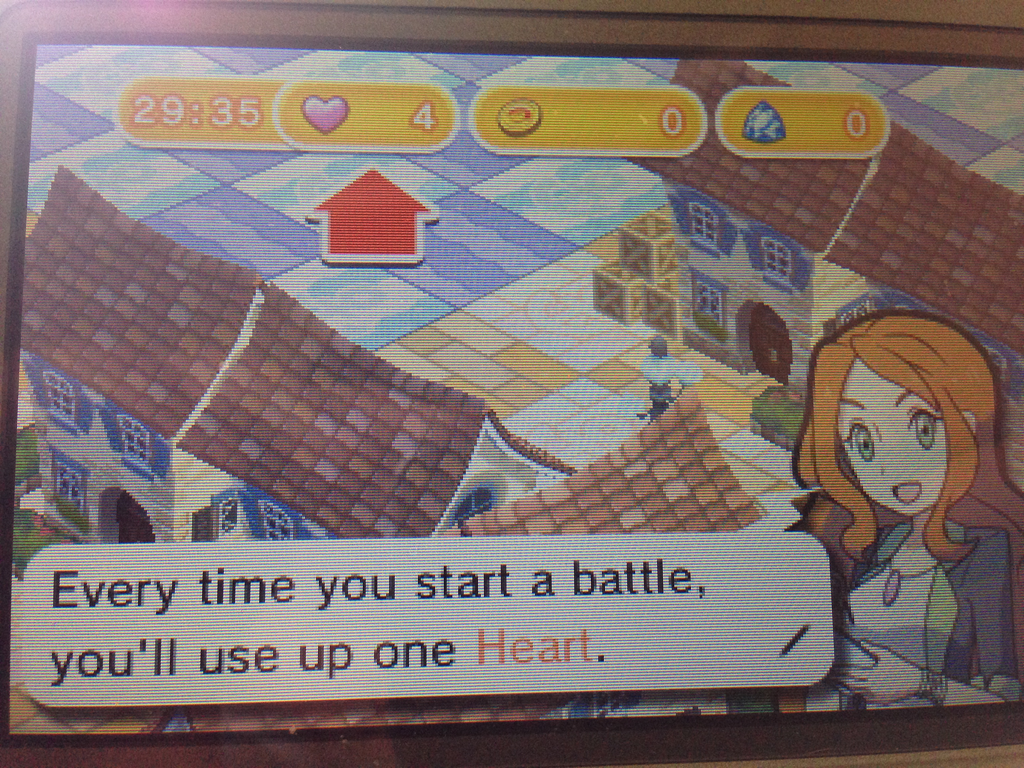
Before the game teaches you how things work, it makes sure to tell you that every 30 minutes, the game will replenish hearts for you (but not too many!), so you can keep playing. No hearts means no matches, so you gotta make sure you’re stocked up on hearts:
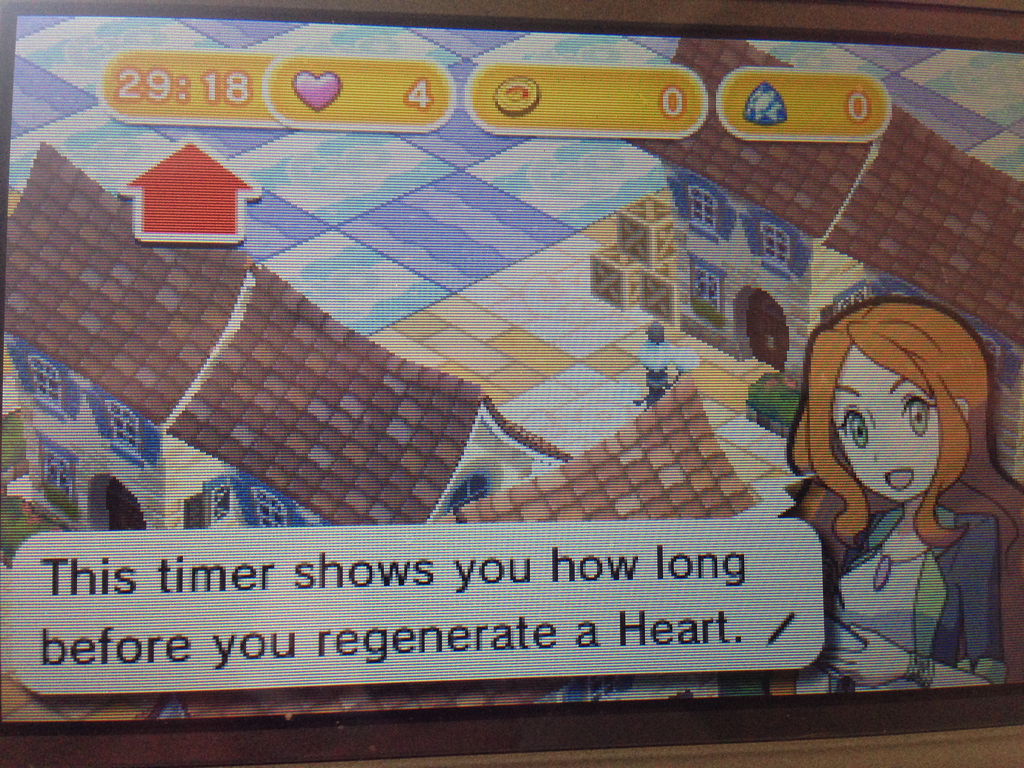
Do you see where this is going? It’s that classic free-to-play bullshit that is commonly seen on mobile games…only on the 3DS. The idea here is that the game limits how much you can play, and gives you two options to deal with this hurdle: you can either wait a set amount of time and have the game give you more hearts, or you can spend money. More on the money bit in a second.
Only after telling you how it’s going to try to wring money from you in the future does Pokémon Shuffle actually tell you how battles work. It’s a classic “match-3” game, like Bejeweled:
The twist is that, instead of jewels, you’ll be matching Pokémon — and Pokemon come with their own strengths and weaknesses. So in the example above, my enemy is Torchic, a fire-type Pokémon with a health bar I have to deplete. Before hopping into the battle, I have the opportunity to select my Pokémon team. I want to make sure I have things that are effective against the Pokémon I’m going to battle:
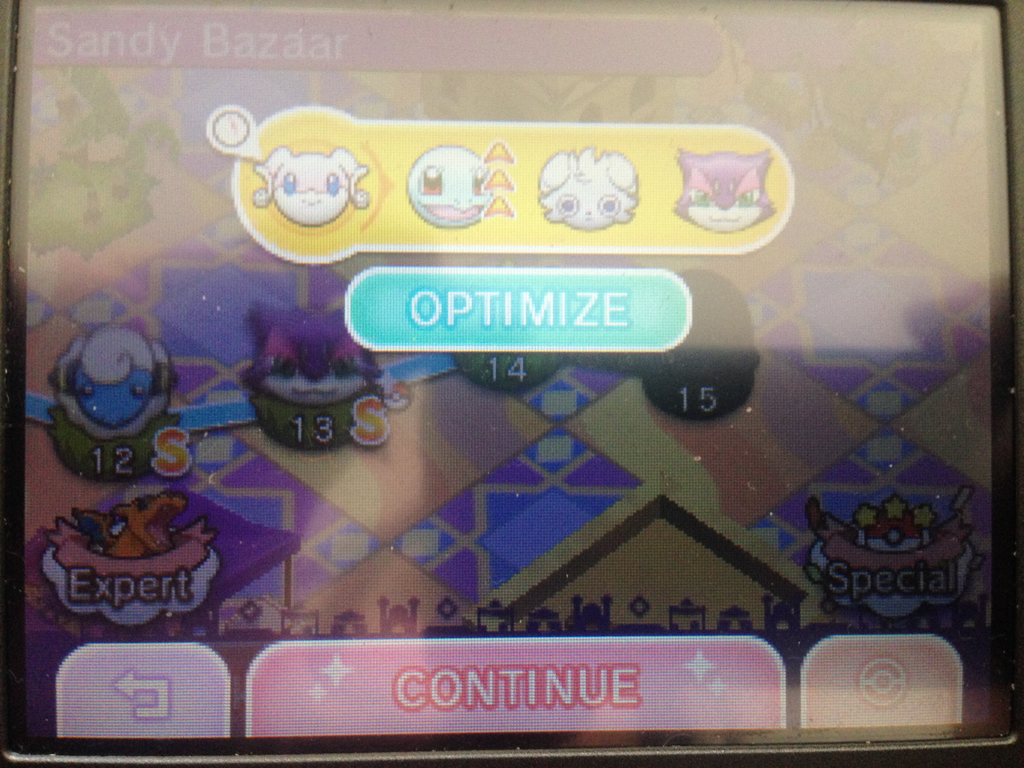
Any Pokémon I put in the first slot can mega evolve, provided I have a mega stone, and have filled up a meter in-game. The mega evolution meter fills up with every match you make of the Pokémon in question — so in this case, the more I match Audino’s face in the battle, the more the meter fills up. Mega evolved Pokémon have the ability to destroy Pokémon around them whenever you match three of them up, instead of simply clearing themselves. It means that you can clear more of the puzzle area in a single go, which is a neat mechanic.
Otherwise, each Pokémon has its own special abilities that can provide support during battle, adding an element of strategy to the game:
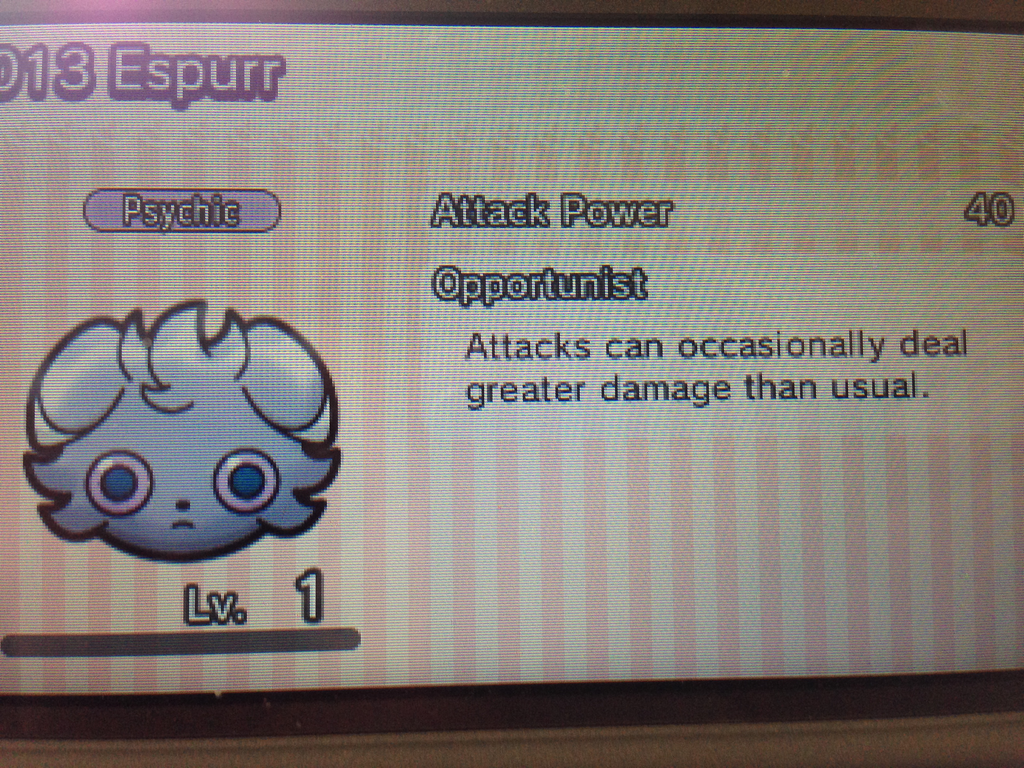
In this case, I brought Squirtle with me to go up against Torchic. If I match three Squirtles from the puzzle area, I’ll do extra damage to Torchic: water is effective against fire. It’s definitely a neat idea, I’ll give it that — but it’s not a new one. Pokémon Battle Trozei did it first!
The Pokémon on the top screen does have some defenses, though. They can, for example, turn some of my Pokémon into blocks of stone, so that it’s harder for me to match Pokémon. But, in the hour and fifteen minutes that I tried the game out today, most matches seemed to be a cakewalk — the exception being when Pokémon had a bigger HP bar.
When you defeat a Pokémon, you get a reward:
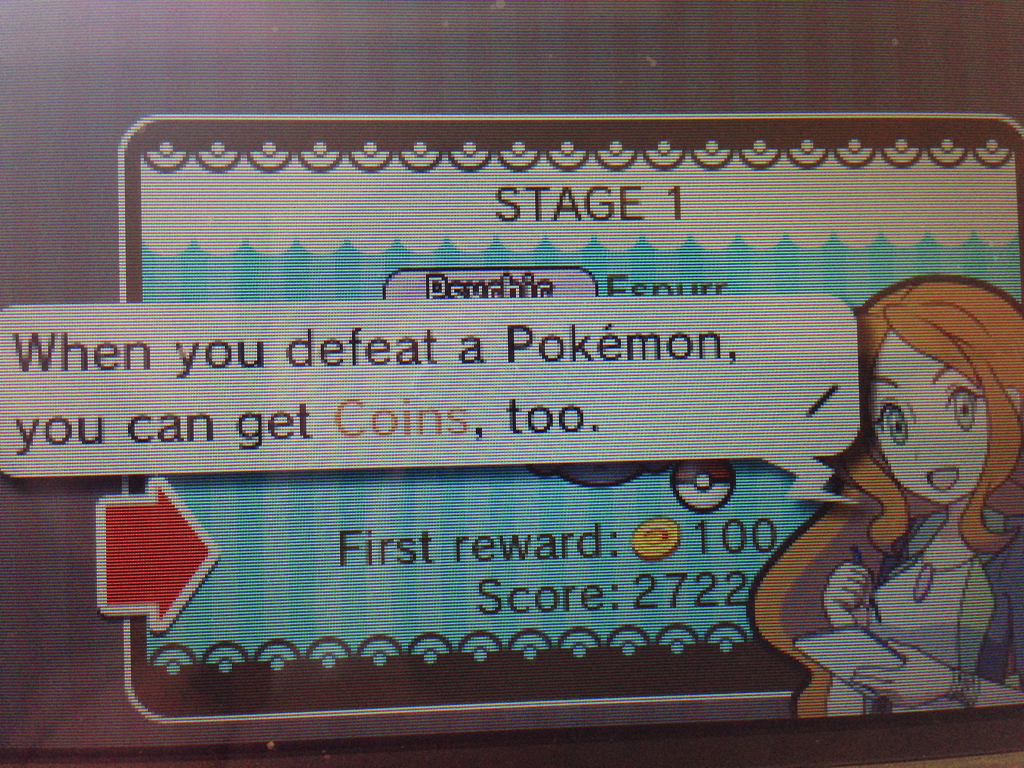
Coins can be used for power-ups that you can purchase before the match starts:
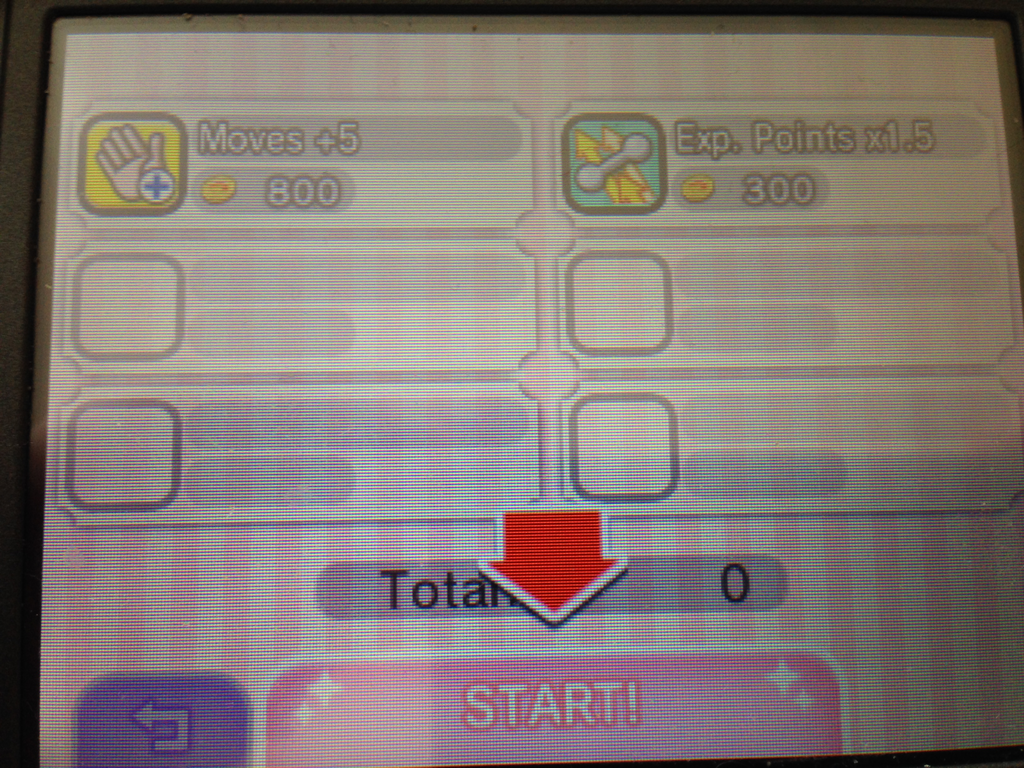
The game also has a different currency: Jewels. In my playthrough, the game automatically gave me my first Jewel, free of charge. Jewels can be used to purchase extra hearts and coins:
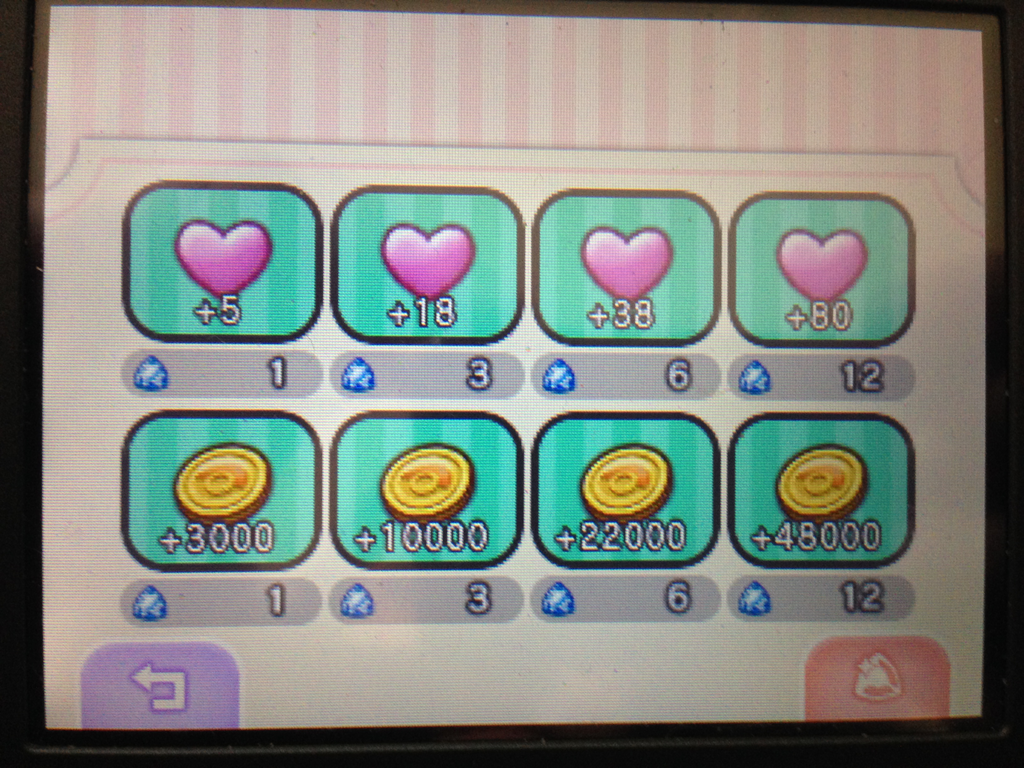
Jewels cost real-world money. At first, I wanted to see how long I could go without spending money. So I played through a few battles, and after about 25 minutes, I was down to a single heart. It was at this point that I noticed that the game gives you the option to “Check In.” If you do, it awards you some extra coins:
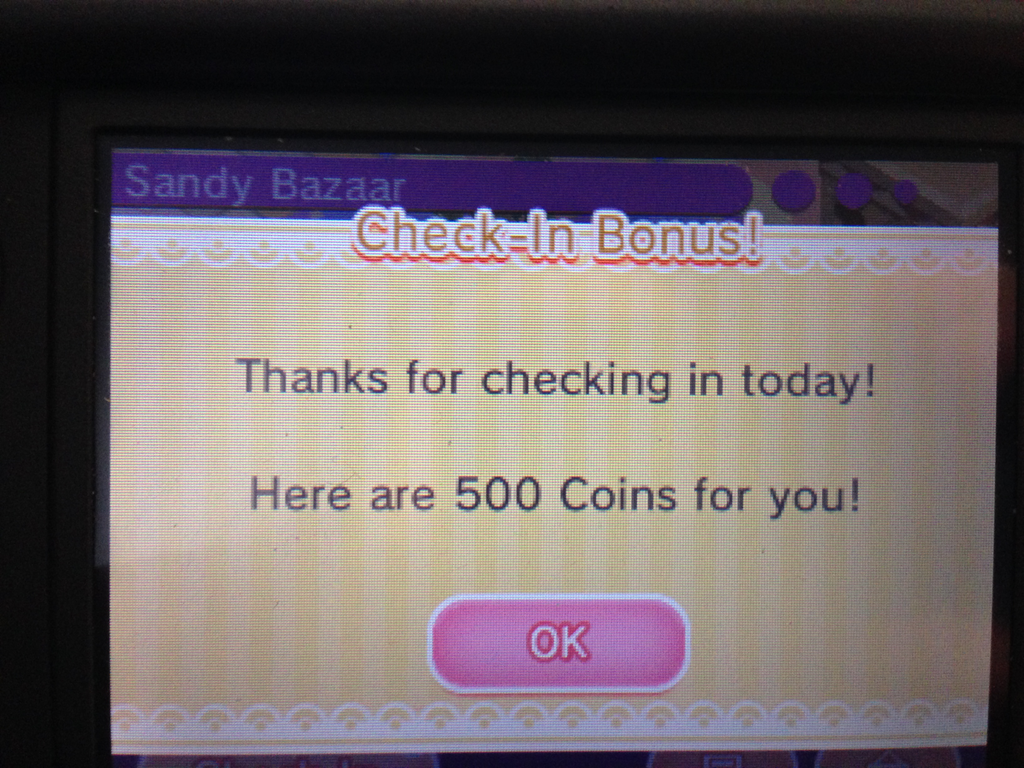
You can only Check In once a day. Additionally, inside this menu you can find special events for download. Right now, the game lets you nab a special encounter with Mew, one of the rarest Pokémon available in the main Pokémon games:
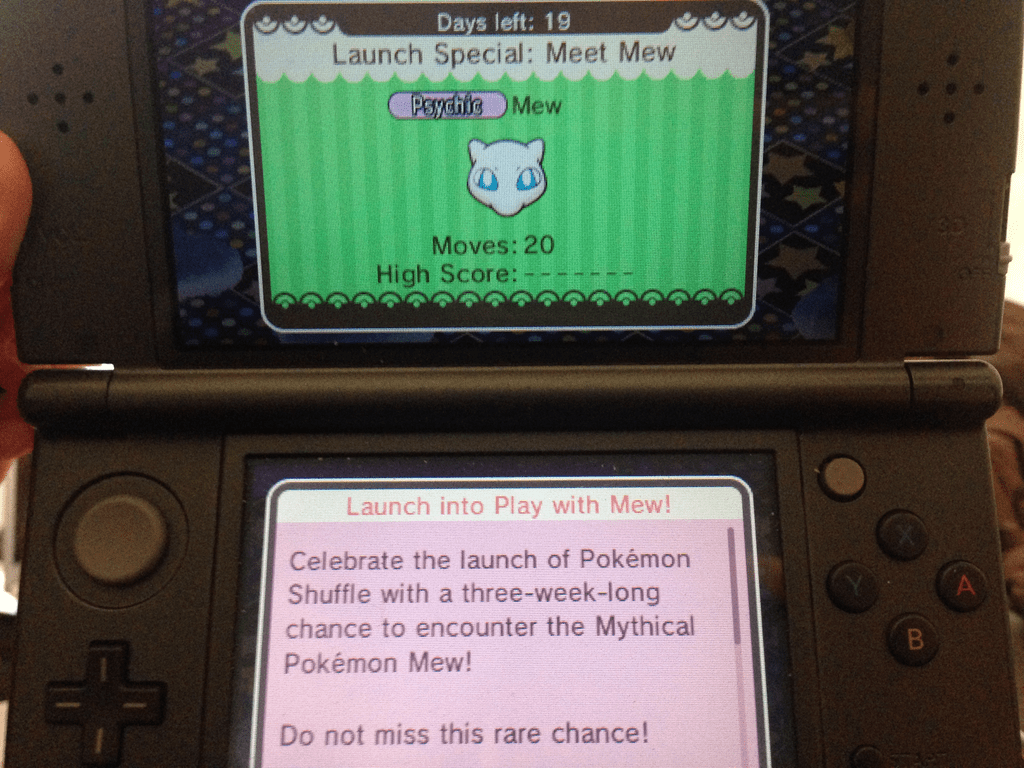
I thought this was a really cool idea, so I used my last heart on Mew.
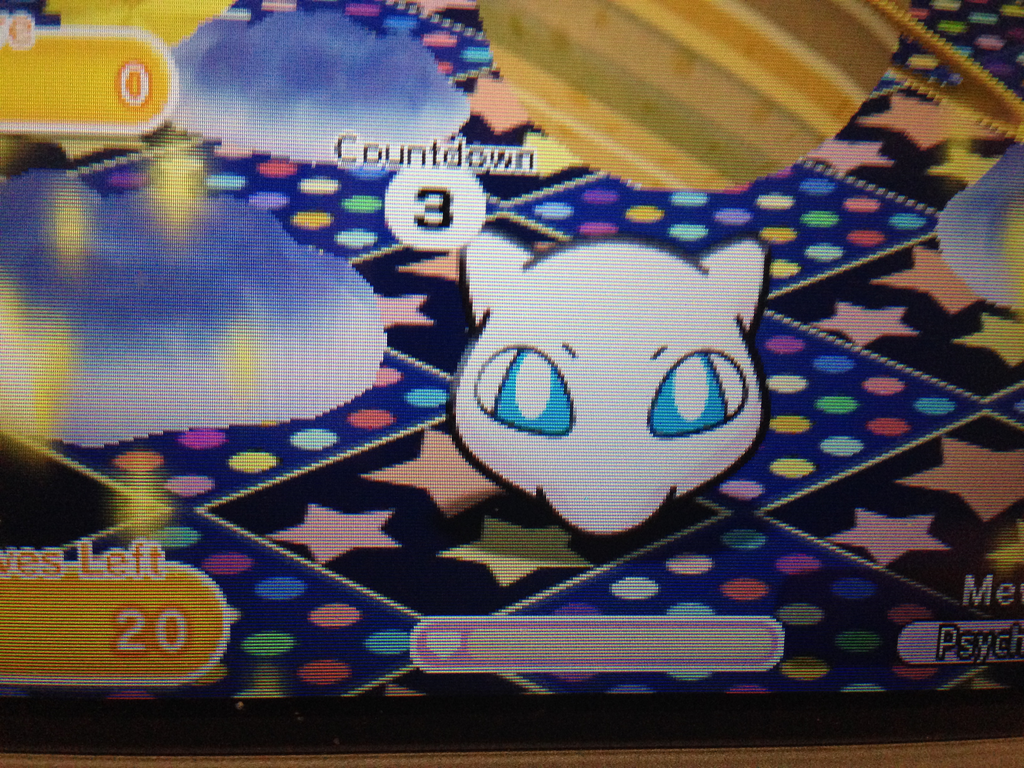
The actual match was not nearly as awesome as I was expecting. Mew understandably has a high health bar, and my first time around, I didn’t couldn’t beat him. Which meant that mid-battle, this screen popped up:
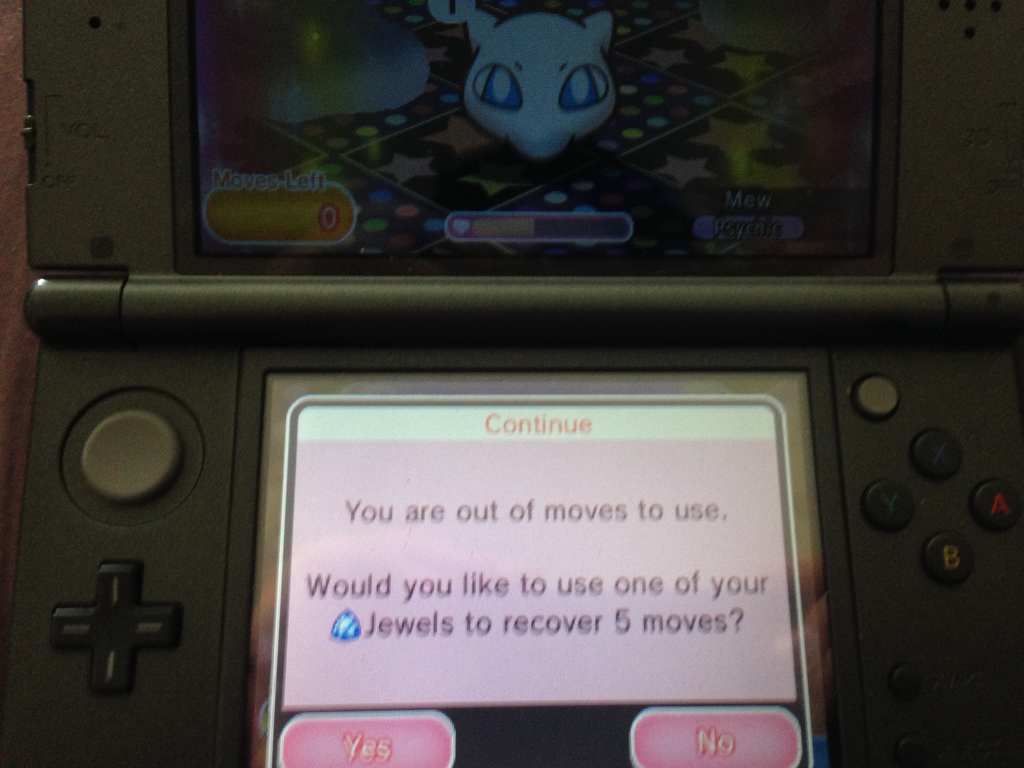
Having Nintendo prompt me use a Jewel to continue a legendary battle against one of its most iconic Pokemon is awful. It’s the last thing I want to experience. The design of the game actively ruined something that could have been cool. Regardless, I used the single Jewel I had for an extra five moves, but even that wasn’t enough to defeat Mew:
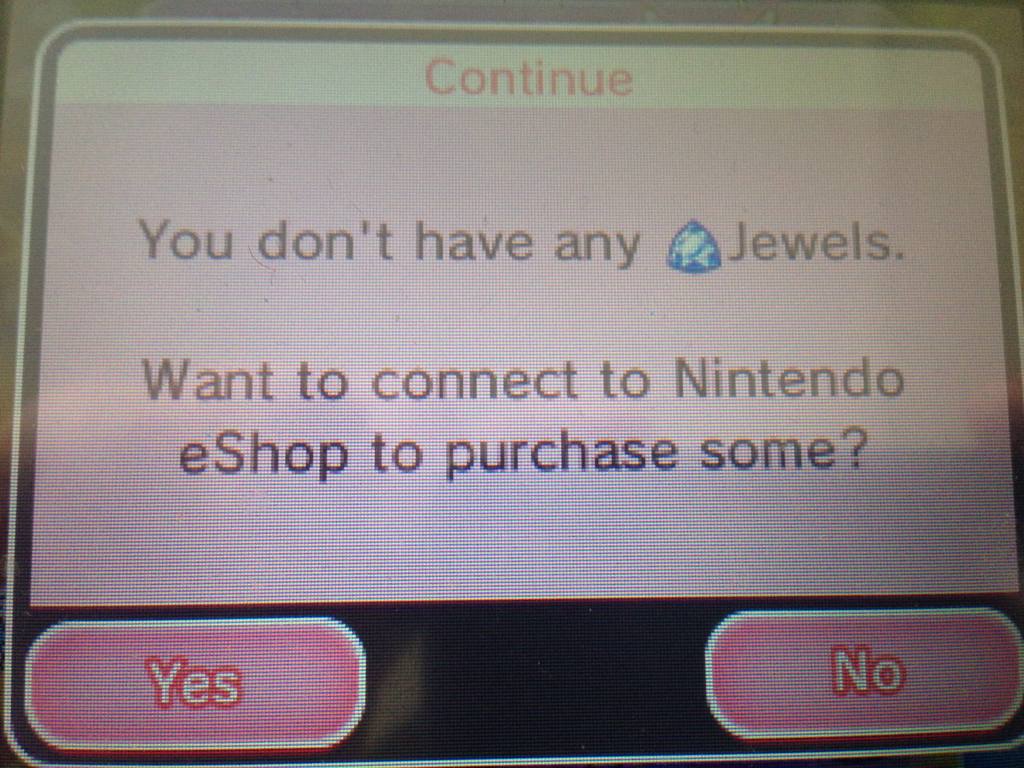
Having the game prompt me twice to use or purchase Jewels to continue a battle against Mew is silly.
Of course, the game is free. And if I waited for a little while, the game would automatically give me another heart, so I could try my hand at Mew again. So I waited 30 minutes. I started the game back up, and I defeated Mew. The game then gave me the option to try to capture Mew — you can capture any Pokémon you defeat, and the chance of success depends on how well you did in the match. The fewer moves you use to defeat a Pokémon, and the higher combos you raise, the better chance you get to capture a Pokémon. Additionally, the type of Pokéball you use affects capture rates too. Great Balls, for example, have a higher rate of capture than normal Pokeballs. Pokeballs are purchased with coins, which I didn’t really have many of after battling Mew. Needless to say, I couldn’t capture Mew — though, had I spent some money on Jewels for more coins, I probably could have. Alas.
After defeating Mew, I played Shuffle for another extra ten minutes. Then, I ran out of hearts again and had to stop playing.
The question then became: would I be willing to a) wait a little while to be able to play a little more or b) spend some money so I could play for a longer chunk of time? Right now, for me, the answer seems to be neither. I’m not super keen on Pokémon Shuffle, even though it’s free, and it’s a perfectly competent match-3 game with some neat mechanics. But when you consider that you can purchase Pokémon Battle Trozei for $US7.99 on the eShop, and get the same experience without the hassles that come with a free-to-play game, why would you bother with Pokémon Shuffle? Those seven bucks in Shuffle wouldn’t give you nearly as much mileage as Trozei could.
It is possible to earn jewels via StreetPass — so the option to play the game without spending money does exist. I haven’t been able to get any of those yet, admittedly. But, these options aren’t really a solution to the problem here: while the game is meaty, you can’t play much of it on any single playthrough. From a business standpoint, this design makes sense, sure. Strangely, it even feels like a very Nintendo-like design, given how much they like to remind players that they should take breaks while playing games. Regardless, microtransactions are still really annoying in practice, and they manage to ruin the coolest things that Shuffle has to offer. I just hope that games like Pokémon Shuffle are just the result of Nintendo’s early experiments with microtransactions, and not a sign of things to come.
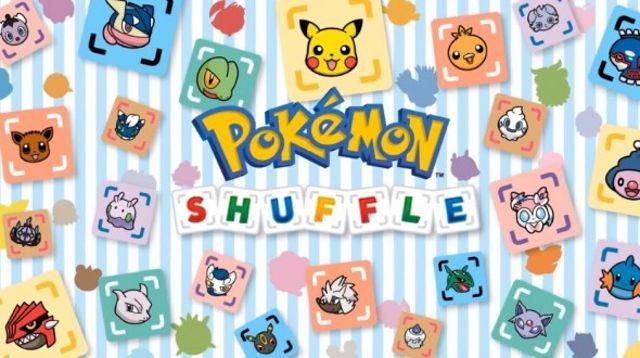
Comments
3 responses to “Pokémon With Microtransactions Is Just As Bad As It Sounds”
Fun game but the worst use of lives or energy I have encountered. No money will be had from me.
It’s OK when Nintendo does it.
Not impressed, Nintendo. Not impressed.
Firstly, the game came out two days ago, not today. Secondly, did you honestly expect to defeat and capture Mew with what you’re given at the beginning? Most of the other points are valid but it seems a lot of the frustration could have been avoided.
Yeah installed it last night played until I ran out of hearts, played again this morning until I ran out of hearts, it’s an enjoyable game, but really microtransactions on a handheld like this?